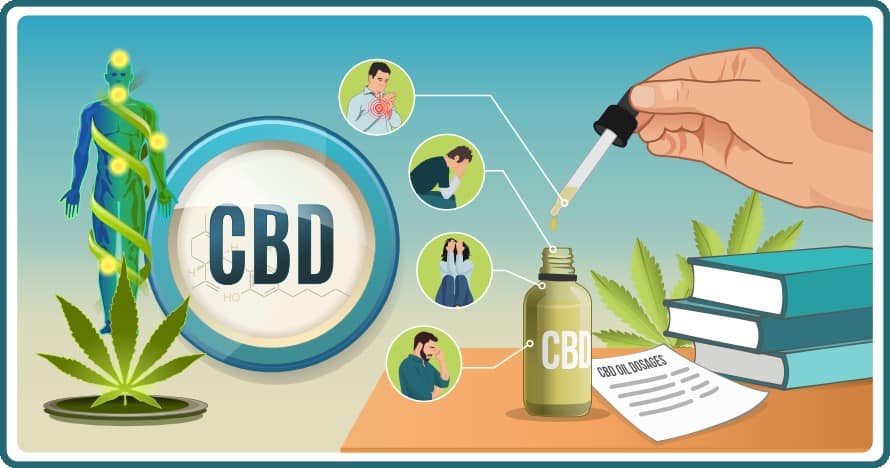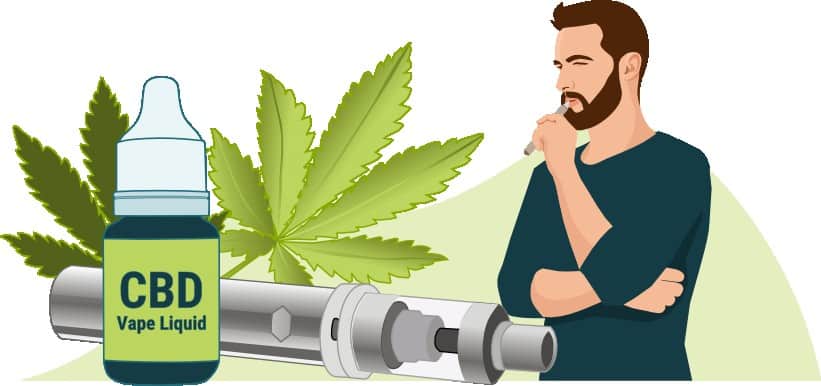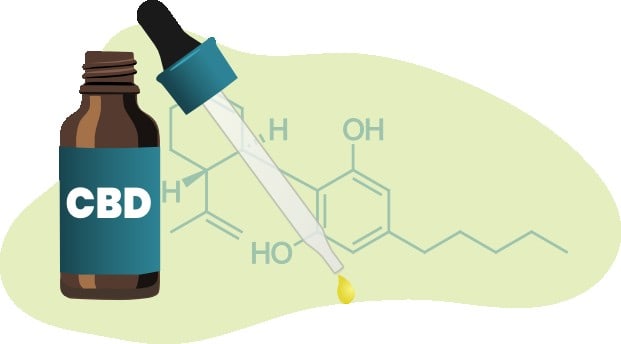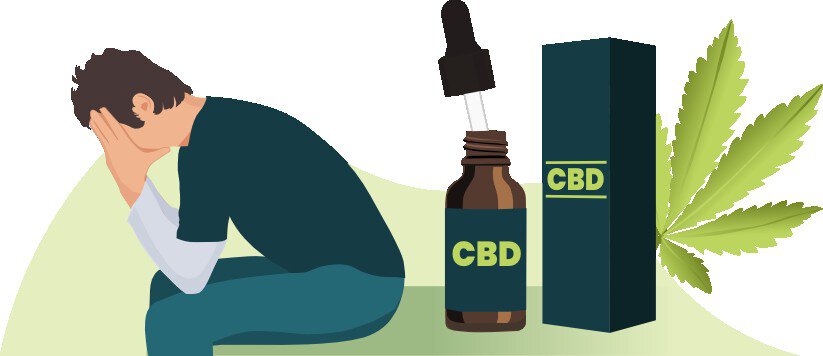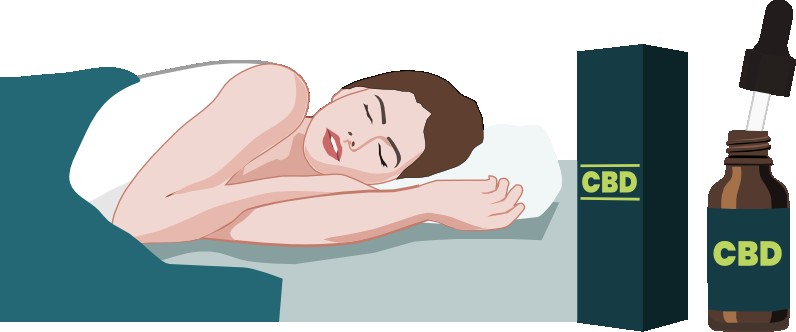June 11, 2019
The Ultimate CBD Dosage Guide for Anxiety, Pain, Epilepsy, and More by Winston

CBD Graphic Art
Source: How to Use CBD Oil (Dosage Guides for Anxiety, Pain, Epilepsy, and more) | Herbonaut
Winston of the Herbonaut blog gives us a deeper look at cannabidiol (CBD) oil, its many uses, benefits, and proper dosages.
This article will also be featured in the sixth issue of The Burgundy Zine.
If you’ve been struggling to find clear information on how to use CBD oil, the tips in this guide will help you find the most effective way to use it.
Since there are no official guidelines on doses or methods to take CBD oil, we analyzed over 40 scientific articles to look for dosage guides and optimal methods of use. Plus, we tested over 30 CBD oils to see what doses and methods worked best for us.
The results we found are a must-read for anyone that wants to use CBD oil.
The best part?
You’re going to get specific dosage guides for different conditions based on scientific research.
The Different Methods to Take CBD Oil
You can take CBD oil in two different ways:
- Orally (this includes both oral and sublingual ingestion)
- Through vaping it.
Both of these methods have their pros and cons, which we’ll talk about next.
The Benefits and Downsides of Taking CBD Oil Orally
The biggest benefit of taking CBD oil orally, assuming you’re taking a full plant extract CBD oil (which you should as you’ll learn later), is taking CBD closest to how nature intended it to be.
This isn’t some woo-woo stuff. Science has proven that the compounds found in the Cannabis plant (including CBD) are more effective when taken together. This process is called ‘the entourage effect.’
The entourage effect refers to the process of all the different cannabinoids, terpenoids, and flavonoids in cannabis influencing each other’s pharmacological effects. This either enhances each other’s effects and/or mitigates each other’s side-effects.
CBD oil tincture
Source: How to Use CBD Oil (Dosage Guides for Anxiety, Pain, Epilepsy, and more) | Herbonaut
CBD as an isolated compound is greatly beneficial for your health. In theory, however, taking CBD as part of a full plant extract will have more potent effects.
In fact, a recent study that looked at the CBD use of epilepsy patients found patients that used CBD in the form a full plant extract oil reported an effective dose of CBD (in mg) that was 4-times less than the patients that used a purified CBD product. If a full plant extract CBD oil is 4-times more potent than a purified CBD product like CBD Isolate for epilepsy patients, chances are you’ll find similar results for other conditions.
Now, when talking about taking CBD oil orally, we include any method of taking CBD oil that goes through the mouth. This also includes taking CBD oil sublingually.
Swallowing CBD oil and taking it sublingually are not mutually exclusive. To get the strongest effects from your CBD oil, these methods should be used in combination with each other.
What About Sublingual Ingestion of CBD Oil?
To take CBD oil sublingually, place a few drops of CBD oil under your tongue and leave them there for at least 60 seconds.
The mucous membrane beneath your tongue stands in direct connection with your bloodstream. Any substance that easily dissolves in saliva can be taken sublingually, and directly diffused into the bloodstream. CBD oil is a substance that indeed can be taken sublingually effectively.
CBD sublingual demonstration
Source: How to Use CBD Oil (Dosage Guides for Anxiety, Pain, Epilepsy, and more) | Herbonaut
Taking CBD oil sublingually has benefits versus immediately swallowing it.
The main benefit with taking CBD oil sublingually is you avoid the ‘first-pass effect’. The first-pass effect refers to the metabolization/reduction in the concentration of drugs and other substances before they reach the bloodstream.
When you swallow CBD, it has to go through the gastrointestinal tract and liver before entering your bloodstream. The gastrointestinal tract is a more hostile environment for CBD than the mouth because it hosts many different enzymes and acids that are specialized in breaking down compounds, like CBD.
The First-Pass Effect
The liver is specialized in metabolizing compounds like CBD, as well. Any time a drug or substance passes the gastrointestinal tract and the liver, the bio-availability, and effectiveness of the drug or substance is significantly reduced.
When you take CBD oil sublingually, it doesn’t have to go through the gastrointestinal tract at the risk of being broken down and degraded.
Another main benefit of taking CBD oil sublingually is the CBD directly enters your bloodstream. Thus, the effects will be felt quicker compared to when you simply swallow it.
Keep in mind that when taking CBD oil sublingually, it’s still recommended to swallow it after holding it under your tongue for at least 60 seconds. This way you ensure that you get the benefits of all compounds found in your oil, even the ones that might not be very susceptible to sublingual absorption.
Hold the CBD oil under your tongue for 60 seconds before swallowing
Source: How to Use CBD Oil (Dosage Guides for Anxiety, Pain, Epilepsy, and more) | Herbonaut
Although most CBD oil manufacturers add edible oils to their formulations, we recommend taking CBD oil with a teaspoon of olive oil (or any other healthy and edible oil for that matter). Recent research has shown that CBD has a higher bio-availability when taken together with other dietary lipids (like olive oil).
Taking CBD oil by swallowing it (without using the sublingual method first) doesn’t have any benefits. That’s why you should always take your CBD oil sublingually before swallowing it (when taking it through oral administration).
The Benefits and Downsides of Vaping CBD Oil
CBD vape liquid
Source: How to Use CBD Oil (Dosage Guides for Anxiety, Pain, Epilepsy, and more) | Herbonaut
Although some CBD oils can be vaped, most edible CBD oils are not suitable for vaping. When you inhale edible oils over an extended period, you risk getting exogenous lipid pneumonia, an inflammatory lung disease that in some cases causes severe damage to your lungs.
When you vape CBD oil, you have to make sure that it’s specifically manufactured for vaporizing. One simple way to make sure that your CBD oil is vapeable is to look for ingredients like vegetable glycerin (VG) and/or propylene glycerol (PG).
In general, unless explicitly stated that your CBD vape oil is edible as well, it is not recommended to ‘eat’ it.
Although both VG and PG are considered safe for consumption (within certain limits, for PG it’s 11.4 mg/lbs of body weight or 25 mg/kg of body weight per day), PG is not a natural substance and I personally would avoid eating it if I can. Also, CBD vape oils sometimes contain other ingredients, like flavorings, that can be made of chemicals that I personally wouldn’t want to eat, either.
The main benefit of vaping CBD vape oil is that you’ll feel the effects of the very fast – sometimes even immediately.
Another benefit of vaping CBD vape oil is it has a higher bio-availability than eating it, meaning you’ll need fewer milligrams of CBD to feel the same effect (although this effect could be dampened by the fact that CBD vape oils are usually not full plant extracts, meaning you won’t experience the beneficial effects of the ‘entourage effect’).
Another benefit of vaping CBD vape oil is that it’s discreet. When you vape CBD vape juice with a regular vape pen, no one will associate your vaping with CBD use. Vaping has become a somewhat of a socially accepted behavior, and CBD doesn’t have a particular smell, which means you can easily stay under the radar while you’re puffing away.
The main downside of vaping CBD vape oil is there aren’t many CBD vape oils that are full plant extracts.
Full plant extracts contain many other beneficial compounds that are found in the Hemp plant (other cannabinoids, terpenoids, flavonoids). With CBD vape oil, it’s hard to benefit from the aforementioned ‘entourage effect’ that makes CBD more potent.
How Much CBD Oil Should You Take? CBD Oil Dosage Guidelines
CBD oil tincture graphic
Source: How to Use CBD Oil (Dosage Guides for Anxiety, Pain, Epilepsy, and more) | Herbonaut
First things first:
There are no official dosage guidelines related to effective CBD use. All we can do is look at CBD doses used in studies, scrutinize anecdotal reports, and look at our own experiences with CBD oil.
It’s also important to note that different methods of CBD oil consumption come with different levels of bioavailability. An effective dosage is also highly dependent on the method of use.
Add to that the fact that there are large differences between individuals in the metabolism of CBD and other physical characteristics, like weight and body mass, and you’ll quickly understand why it’s difficult to give a general dosage guideline.
That being said, and based on the latest scientific research, we can come up with guidelines that have a somewhat scientific basis.
The Maximum Known Dose of CBD That’s Considered Safe
Currently, it’s unknown whether you can overdose with CBD.
The maximum dose of CBD ever taken in a study without any serious side effects is 1500mg of CBD. Taking 1500mg of CBD means clearing a big bottle in a single use.
CBD oil is not meant to be taken in that way. Usually, you only administer 5-10 drops of CBD oil under your tongue. Never will anyone recommend finishing a big bottle of CBD oil in a single gulp.
CBD Dose for Epilepsy
CBD and epilepsy graphic
Source: How to Use CBD Oil (Dosage Guides for Anxiety, Pain, Epilepsy, and more) | Herbonaut
One study that looked at the effects of CBD on patients with epilepsy found a dose of 200-300mg taken daily had a positive effect on the occurrence of convulsive crises in 7 out of 8 patients.
A survey-based study that looked at CBD use among epilepsy patients found 73% of patients used CBD, took a daily dose between 10–25 mg/kg.
If you weigh 70kg, this amounts to 700-1500mg of CBD. As you can see, this is a very high dose – and for most people, it’s financially impossible to use such a quantity without their health insurance backing them up.
It’s important to note here that the patients in this study used purified CBD or CBD Isolate. A recent study that looked at the differences in effects and doses between epilepsy patients that used CBD-rich cannabis extracts vs. purified CBD products, found that CBD-rich cannabis extracts were not only more effective in treating epilepsy symptoms, but were more effective with a dose that was 4-times smaller than the reported average effective dose of purified CBD products.
The average daily dose reported by the patients for purified CBD was 25.3 mg/kg/day, while the average daily dose of CBD equivalent reported for CBD-rich cannabis extract was only 6.0 mg/kg/day.
It’s still quite expensive to take CBD at a daily dose of 6.0 mg/kg/day in the form of a CBD-rich cannabis extract, but it’s quite a bit cheaper than taking purified CBD at a daily dose of 25.3 mg/kg/day.
Further studies should show whether you can achieve the same beneficial results for other conditions like anxiety and pain, with 4-times less CBD when taken in the form of CBD-rich cannabis extract compared to when taken in the form of a purified CBD product.
CBD Dose for Psychosis
CBD and psychosis graphic
Source: How to Use CBD Oil (Dosage Guides for Anxiety, Pain, Epilepsy, and more) | Herbonaut
There haven’t been any large-scale studies that look at the effects of CBD on psychosis in humans. The few studies that did look at the effects of CBD on psychosis found limited evidence for its use.
For example, a 19-year old woman with schizophrenia had successful treatment with a dose of 1200 mg/day of purified CBD in a case study.
In another study that compared the effects of CBD vs a traditional antipsychotic named ‘amisulpride,’ researchers found that a daily dose of 200mg CBD, increased stepwise by 200mg per day to a daily dose of 200 mg four times daily (total 800 mg per day) each within the first week, was as effective as the traditional antipsychotic medicine amisulpride, while CBD had a less side effects.
Although the researchers in this study don’t explicitly state that they used purified CBD, I think it’s safe to assume that (unless stated otherwise), researchers use a purified form of CBD instead of it in the form of a full plant extract.
Again, these doses of CBD are high. Unless your insurance company covers your purchases, it might be financially impossible to supply yourself with these large amounts of CBD.
CBD Dose for Anxiety
CBD and anxiety graphic
Source: How to Use CBD Oil (Dosage Guides for Anxiety, Pain, Epilepsy, and more) | Herbonaut
A 2015 study that reviewed the results of over 25 human experimental, clinical, epidemiological and chronic studies found the current evidence strongly supports the potential for CBD as a treatment for anxiety disorders. The recommended oral doses range from 300mg to 600mg.
There’s especially strong evidence for CBD reducing experimentally induced anxiety, like public speaking tests, and for reducing social anxiety disorder.
It’s important to note here that the respondents used a purified form of CBD and not a full plant extract.
Unfortunately, this means no dose recommendations can be given in regards to taking CBD in the form of a full plant extract for anxiety.
CBD Dose for Pain
CBD and pain graphic
Source: How to Use CBD Oil (Dosage Guides for Anxiety, Pain, Epilepsy, and more) | Herbonaut
Most studies that found painkilling effects with cannabis-based medicines used a combination of both THC and CBD. Unfortunately, the doses used in these studies can therefore not be translated to recommendations for a CBD-only dose.
There is, however, one recent study that found painkilling effects of CBD in kidney transplant patients, with an initial dose of 100 mg/day, progressively increasing up to 300 mg/day (spread out over the day in smaller doses).
Interestingly, this same study found that more CBD is not always better. One of the patients experienced stronger painkilling effects with lower doses of CBD (it’s unclear how much lower than 300 mg/d).
CBD Dose for Sleep
CBD and sleep graphic
Source: How to Use CBD Oil (Dosage Guides for Anxiety, Pain, Epilepsy, and more) | Herbonaut
Studies that specifically looked at the effects of CBD on sleep in healthy patients are rare. Most studies that looked at the effects of CBD on sleep had subjects who suffered from conditions like PTSD or Parkinson’s Disease. Therefore, the results of these studies bear little relation to the average person who’s looking to use CBD for sleep.
That said, there’s one study done in 1981 that looked at the effects of CBD on sleep in otherwise healthy insomniac volunteers.
The researchers tested three doses with purified crystalline CBD: 40mg, 80mg, and 160mg. The volunteers reported significantly less dream recall with all three doses of CBD (compared to placebo), which could indicate fewer sleep disruptions.
Again, it’s important to note that the researchers used a purified form of CBD, and it’s possible that you’ll get the same effects of 160mg of purified CBD when you take fewer mg of CBD in the form of a full plant extract.
CBD Dose for General Health
CBD and general health graphic
Source: How to Use CBD Oil (Dosage Guides for Anxiety, Pain, Epilepsy, and more) | Herbonaut
Studies that look at the effects of CBD generally hone in on a specific condition or the effects of it on the symptoms of a specific condition.
That said, CBD has strong anti-inflammatory and anti-oxidant characteristics. You don’t need a specific condition to reap the benefits of CBD oil. Anyone can benefit from food with strong anti-inflammatory and anti-oxidant properties, and the same principle applies.
Our unscientific and unofficial recommendation for taking CBD oil for general well being is 10-20mg of CBD daily, in the form a full plant extract/full spectrum CBD oil.
What’s Next
Now that you’ve learned the best way to take your CBD oil, and learned what doses of CBD oil potentially work best for specific conditions (based on the latest scientific articles), you have a better chance of using your CBD oil effectively.
If you’re still looking to find a potent CBD oil, the products in this article have all submit their oil to third-party analysis and have certificates of analysis that checked for contaminants like heavy metals and pesticides:
If you want to read up on the potential benefits of CBD oil, check out the article below where we review the most important scientific articles about the effects of CBD on health:
If you want to learn more about how CBD Oil could be beneficial specifically for pain or anxiety, check out the articles below:
Head on over to Winston’s blog to keep up with the latest research on CBD!
Interested in having content featured in an upcoming blog post or issue of The Burgundy Zine? Head on over to the submissions page!
For all other inquiries, please fulfill a contact form.

